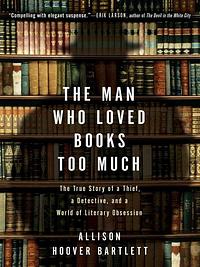Take a photo of a barcode or cover
Bartlett is a journalist playing at being a storyteller - lucky for me, her the facts and characters in her story overcame her stilted narration. The narrative itself meandered, wandered even, from place to place. I expect better from a journalist who would be expected to write in consecutive peices.
But the characters and their immersion in the rare book world saved the book for me. The people, trivia and quotes that littered this layman's education in the world of rare book collection made plodding through bland portions of the text worth the trouble.
But the characters and their immersion in the rare book world saved the book for me. The people, trivia and quotes that littered this layman's education in the world of rare book collection made plodding through bland portions of the text worth the trouble.
informative
medium-paced
This book was dangerous. It reminded me how much I loved books, and how much I strive to collect them. My walls are already covered - I half less than a foot of shelf space left, and my to-read pile would probably be taller than I am if I were to put it all in one stack. I may not be a collector of rare books, but I do have a handful of first editions and signed books in my stacks. The importance to me is the memory of each book - where I was when I read it, where I bought it, etc. Bartlett talks about this connection with books and theorizes that it's why childrens books are so popular. This is definitely a book that makes you feel good about loving literature - it dives into a circle in which books are held above all else rather than looked down upon. Just be careful, it makes you want to go out and buy.
I enjoyed this one for the peek into the world of rare books and book collecting.
Sanders' story and the the author's personal experiences were more interesting than Gilkey's story.
I would not say that Gilkey "loved books too much." Books were just a means to an end for him -- an entry (so he thought in his twisted mind) into upper-class society. He's really just an unrepentant criminal who supports his "lifestyle" through rampant credit card fraud and other forms of theft.
But, it's an educational story...
Sanders' story and the the author's personal experiences were more interesting than Gilkey's story.
I would not say that Gilkey "loved books too much." Books were just a means to an end for him -- an entry (so he thought in his twisted mind) into upper-class society. He's really just an unrepentant criminal who supports his "lifestyle" through rampant credit card fraud and other forms of theft.
But, it's an educational story...
informative
mysterious
tense
slow-paced
adventurous
informative
mysterious
fast-paced
Fascinating. And, I really liked how she ended the book when there wasn't really an ending to the story. It is hard to understand how Gilkey's brain works and I wish Bartlett had pushed him a little harder to explain himself. I also would have liked reading more about Gilkey's and Sanders' own personal histories (childhoods, families, etc). But, overall, an interesting and easy read and a great look into an industry I knew nothing about.
informative
medium-paced
I found this only intermittently interesting, mainly in the asides on book collecting and interviews with book traders who do genuinely love books. Ken Sanders, who tracks down the book thief of the title, is also an interesting character and one I felt the author didn't focus on enough.
The book's problem is that Gilkey is singularly unlikeable and beyond an initial recounting of his actions, uninteresting. The author seems to like him, but cannot convey any convincing reasons for doing so. When first introduced, he appears deluded, entitled, and selfish, with no redeeming qualities. The rest of the book just confirmed this, without adding anything further. His motives actually seem pretty simple and the need for years worth of interviews escapes me. Despite the title, it's also clear that he does not love books at all; rather he views them as status symbols and occasional sources of funds.
The author's moral dilemmas seemed forced, and in my view, her resolution of them was inadequate.
The book's problem is that Gilkey is singularly unlikeable and beyond an initial recounting of his actions, uninteresting. The author seems to like him, but cannot convey any convincing reasons for doing so. When first introduced, he appears deluded, entitled, and selfish, with no redeeming qualities. The rest of the book just confirmed this, without adding anything further. His motives actually seem pretty simple and the need for years worth of interviews escapes me. Despite the title, it's also clear that he does not love books at all; rather he views them as status symbols and occasional sources of funds.
The author's moral dilemmas seemed forced, and in my view, her resolution of them
Spoiler
(doing nothing at all for the most part)
adventurous
informative
fast-paced





